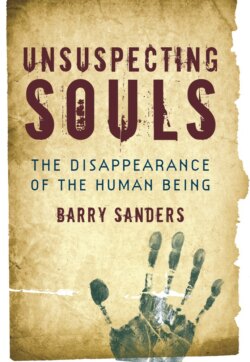Unsuspecting Souls

Реклама. ООО «ЛитРес», ИНН: 7719571260.
Оглавление
Barry Sanders. Unsuspecting Souls
INTRODUCTION | Pictures at a Deposition
ONE | What Is Life?
TWO| When Death Died
THREE| A Couple of Sarahs Later
FOUR | No One’s Dead
FIVE | There Is Only Life
SIX| Coney Island and the Mind
SEVEN | The Draculated Cat
Отрывок из книги
Table of Contents
Title Page
.....
No intellectual groups formed around nitrous oxide in America, but nonetheless it had a following in this country, too. By the 1820s, students at Yale used laughing gas regularly at their weekend parties to break from their studies. Different from England, someone in America found out quickly how to make money off the giggling gas. A Hartford, Connecticut, dentist, Horace Wells, witnessed a volunteer inhale nitrous oxide in 1844, while someone else cut a long gash into the man’s leg; the man looked down at his wound, wondered aloud about the long red line running down his thigh, and began laughing uncontrollably. The next day, Wells had a fellow dentist administer the “laughing gas” to him and extracted one of his teeth. Wells later commented: “It is the greatest discovery ever made. I didn’t feel as much as the prick of a pin.”8 And so nitrous oxide gave birth to a new profession in America: painless dentistry.
Davy, meanwhile, turned his discovery to more serious medical uses, most notably to surgery: “As nitrous oxide, in its extensive operation, seems capable of destroying physical pain, it may profitably be used with advantage in surgical operations in which no great effusion of blood takes place.”9 While he made that statement in 1800, it took almost half a century more, all the way to 1844, for hospital officials to allow his laughing gas into the operating room in the form of anesthesia. The word first enters the English language (from Latin by way of Greek) in 1721, to describe those who, because of some major paralysis or other disabling injury, experience “a defect of sensation.” In November 1846, Oliver Wendell Holmes suggested that the state created by nitrous oxide be named anesthesia, from Greek an, “without,” and aesthesia, “sensibility.” Just two years later, in 1848, anesthesia had already entered common parlance as a loss of all sensation induced by some chemical agent, which, at this early stage in its development, lasted for no more than two or three minutes.
.....